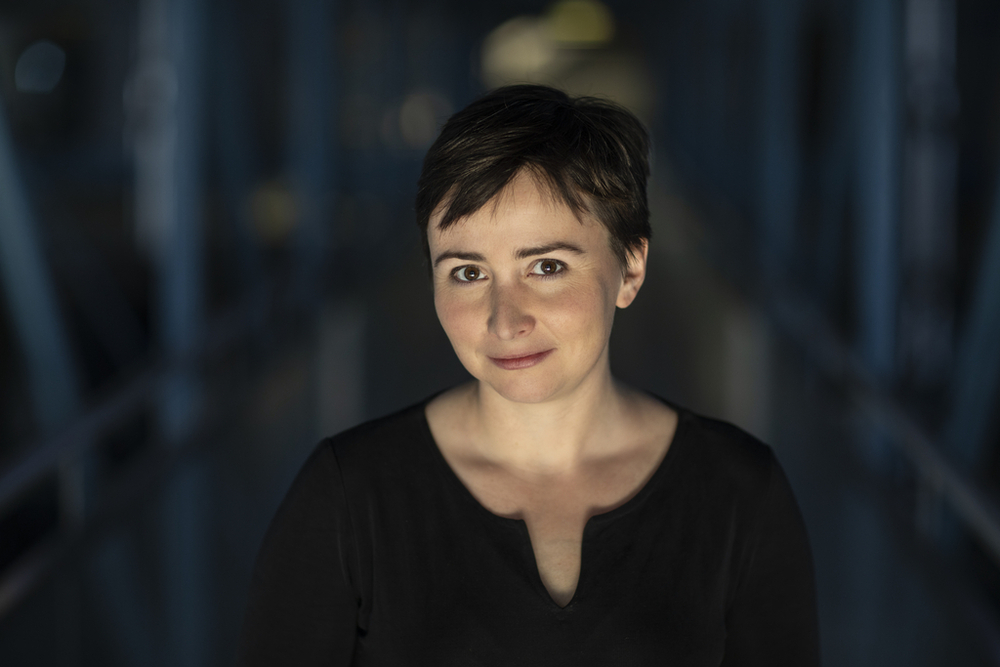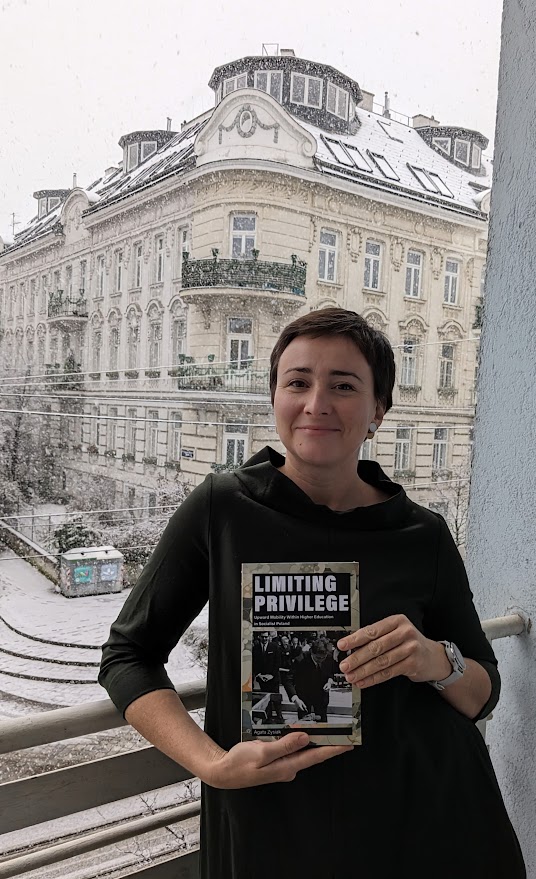 Dr Agata Zysiak (photo: Dr Bartosz Kałużny)
Dr Agata Zysiak (photo: Dr Bartosz Kałużny)
Dr Agata Zysiak deals with historical sociology, works at the Universities of Lodz and the University of Vienna. She popularises the history of the city of Lodz locally in the Topography Association. Previously, she cooperated with universities in Warsaw, Budapest, Vienna and Berlin, as well as in the USA – in Ann Arbor, Detroit, and was a member of the Institute for Advanced Study in Princeton. Currently, she is working on understanding the post-war history of Poland through the prism of the concept of socialist citizenship at the University of Vienna.
How did the English translation of "Punkty za pochodzenie" come about?
The English version of "Punkty za pochodzenie" was supplemented and rewritten with the English-speaking reader in mind during my stay at the Institute for Advanced Study in Princeton, USA almost five years ago.
The process of writing the book in English meant partial translations, multiple edits, changing the structure and adding new parts to the new version of the book. The final linguistic shape is thanks to the wonderful editor, Julia Podziewska, a great editor, is responsible for the final linguistic shape of the publication.
Compared to the Polish edition, greater emphasis was placed on the experience of people who did not have a tradition of studying in their families (so-called first-generation students) and the entire Polish education system, i.e. also secondary schools, where the key selection of future students took place. There is more about changes at the national level, more about female students and professors, and the intersection of gender and class. However, I devoted less space to disputes about the intelligentsia and the enslaved university, which are important in Poland. There is less about the University of Lodz and Lodz. The entire book is shorter but denser.
Which publishing house has published your book?
The book was published by the American university publishing house Purdue University Press. It has been available at an affordable price on the publisher's website since 15 December, and in two years it will be available for free download in open access. I wanted to find a university publishing house due to the reliable review process, good editing, but also the affordable price of the published book. Work on the book took a very long time, also for reasons completely beyond my control, so I am very happy that I can finally see the effect of the work of so many people: reviewers, editors, graphic designers, but also all the outstanding researchers who commented on the fragments and supported me in this venture.

Photo from the private archive of Dr Agata Zysiak
To promote the publication, a real tour around the United States was organised.
Where was the book presented and how was it received
I had the pleasure to meet audience interested in Central and Eastern Europe at universities such as: University of Illinois Chicago, Columbia University, New York University, University of California at Berkeley, Stanford University and at the ASEEES meeting in Philadelphia.
There were always great discussions. A remark that the category of class is not very present in historical research in the US constituted a recurring comment in questions and comments. People were interested in difficulties in advancement and the mechanisms of social reproduction under the pressure of political reforms, the impact of historical events on long-term processes, the intersection of gender, class, religion, ethnicity and their impact on educational selection mechanisms. They wanted to know what the possibility of opening the elites to people of non-elite origins was.
We already know what the audience in the United States was interested in, and what did you notice during these meetings?
The fact that the story about the University of Lodz or the Polish People's Republic does not have to be a local curiosity, but an important study of social change looking at the education reform and the difficulties experienced by people who are promoted, an important voice about the role of state socialism and the socialist model university in the broader debate on higher education is what is important to me.
Finally, that qualitative, biographical research allows for a deeper understanding of historical processes and the strength of this book is its firm grounding in the material: analysing speeches, the daily press, biographies, tracing the sociological research of the period, but at the same time work on sociological theory and grounding in contemporary international debate.
Thank you very much for the interview.
Me too and I encourage you to read the book.
Why does Lodz need a university?
A video recorded in 2020 based on the experience gained while writing "Punkty za pochodzenie".
A word from the American publisher
State socialism tried to industrialize, urbanize, encourage the more frequent washing of hands, urge people to leave the church, emancipate women, and electrify cities—all within a single lifetime. Central to these initiatives was extending educational opportunities to the working class and creating a vision of an egalitarian socialist university that offered advancement for all. Limiting Privilege: Upward Mobility Within Higher Education in Socialist Poland traces the possibilities and limits of this goal by looking at a model socialist university established in 1945 in the working-class city of Łódź, Poland. Initially a flagship project of socialist modernization, the university tried to offer social advancement by privileging admission for peasant and working-class children, but these efforts were often fought by the elite who sought to preserve their privilege. By looking at first-generation students, intelligentsia faculty, and an industrial city, Limiting Privilege explores a complex story about utopian visions, failed aspirations, and reluctant academia.
This may well be the most important book on the history of communist Poland written so far this century, but that's not mainly why I'll be recommending it. Henceforth, if anyone expresses an opinion on affirmative action, the role of social justice commitments in academia, the use of quantified metrics in higher education, or the interplay between broader social structures and university policy, I'll ask them, 'Do you know Agata Zysiak's work? If not, read her new book, and then we'll talk
– Brian Porter-Szűcs, author of "Poland in the Modern World: Beyond Martyrdom".
This volume captures an epochal clash that occurred in early Stalinist Poland between universities bent on maintaining ivory tower freedoms and a communist regime determined to make them tools of radical social reform. Neither side intended the end result. Universities were modernized and helped millions move up the social ladder, while becoming loyal servants of the system; yet they remained bastions of privilege stuck in feudal trappings, which produced the most cutting dissent in the Soviet Bloc. In her humane and dispassionate study, Zysiak takes readers to the heart of controversies and drama, remaining attuned to social theory while never losing sight of the humans who make history
– John Connelly, Sidney Hellman Ehrman Professor of History, University of California, Berkeley.
 Photo: Dr Bartosz Kałużny.
Photo: Dr Bartosz Kałużny.
Award of the Polish Academy of Sciences
During her academic career, Dr Agata Zysiak has been awarded many times and honoured with scholarships. She received the Kazimierz Moczarski Historical Award for the book described here, "Punkty za pochodzenie" in 2017. She also received the Bronisław Geremek Prize for the first scientific book, and the doctoral thesis on the basis of which "Punkty..." was created, received the award named after Inka Brodzka-Wald.
The Award of the Presidium of the Branch of the Polish Academy of Sciences and the Conference of Rectors of Lodz Public Universities received in November 2023, in recognition of her services to Polish science, conferred to outstanding scientists and artists who are under 38 years of age is the latest distinction for Dr Agata Zysiak.
The awards were conferred in five fields – humanities, biological and medical sciences, technical sciences, exact sciences and artistic sciences, and were presented at the Teacher's Club at Piotrkowska 137.
Apart from Dr Agata Zysiak, distinctions were also awarded to Prof. Michał Bijak, Prof. Łukasz Półtorak from the University of Lodz, Professor Grzegorz Liśkiewicz from the Lodz University of Technology and Dr Michał Jankowski from the Strzemiński Academy of Fine Arts Łódź.
Source: Dr Agata Zysiak (Department of Rural and Urban Sociology, Faculty of Economics and Sociology)
Edit: Michał Gruda (Communications and PR Centre, University of Lodz)
The mission of the University of Lodz is to conduct reliable research and actively disseminate facts and research results so as to wisely educate future generations, be useful to society and courageously respond to the challenges of the modern world. Scientific excellence is always our best compass. Our values include: courage, curiosity, commitment, cooperation and respect.
